 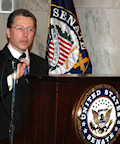 4/2/2009 - American Hungarian Federation Actively Participates in CEEC Congressional Policy Reception in Honor of NATO
and Its Enlargement. The reception, sponsored by the Central and East European Coalition (CEEC), was held on March 25th in the US Senate's famous Russell Caucus Room on Capitol Hill. AHF Co-President, 4/2/2009 - American Hungarian Federation Actively Participates in CEEC Congressional Policy Reception in Honor of NATO
and Its Enlargement. The reception, sponsored by the Central and East European Coalition (CEEC), was held on March 25th in the US Senate's famous Russell Caucus Room on Capitol Hill. AHF Co-President, 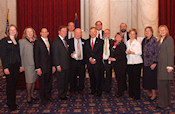 Frank Koszorus, Jr., outlined the accomplishments of the CEEC. 2009 marked the 10th anniversary of Hungary's accession to the alliance. Frank Koszorus, Jr., outlined the accomplishments of the CEEC. 2009 marked the 10th anniversary of Hungary's accession to the alliance.
The CEEC consists of 18 national ethnic organizations representing more than 20 million Americans of Central and Eastern European heritage. The American Hungarian Federation (the “Federation”), an active member of the CEEC, 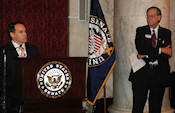 helped to plan and organize the reception. The Federation’s CEEC representative is its Co-President and Chairman of its International Relations Committee, Frank Koszorus, Jr. helped to plan and organize the reception. The Federation’s CEEC representative is its Co-President and Chairman of its International Relations Committee, Frank Koszorus, Jr.
Michael Sawkiw, Jr., Director of the Ukrainian Congress Committee of America served as the CEEC’s Master of Ceremonies. He began the program by introducing Mr. Koszorus to summarize the CEEC’s substantial contribution to the NATO enlargement debate.
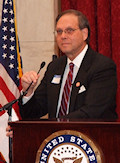 Mr. Koszorus, drawing on his more than 15 year active involvement with the CEEC and advocacy on behalf of NATO’s enlargement, including the accession of Hungary, outlined the accomplishments of the CEEC. He noted that: Mr. Koszorus, drawing on his more than 15 year active involvement with the CEEC and advocacy on behalf of NATO’s enlargement, including the accession of Hungary, outlined the accomplishments of the CEEC. He noted that:
![Koszorus emarked: “[s]uccess, it has been said, has a thousand parents, while failure is an orphan. Well, I am proud to say that the CEEC was a strong, persistent and effective voice in support of NATO’s enlargement in 1999 and 2004. But it did not quit then, as the CEEC continues to support the open door policy to include countries which are ready, able and willing to join the Alliance and which are democratic and respect the rule of law, including human and minority rights.”](images/NATO_Congress_2009/NATO_Congress_2009_FrankKoszorus1_sm.JPG) “[s]uccess, it has been said, has a thousand parents, while failure is an orphan. Well, I am proud to say that the CEEC was a strong, persistent and effective voice in support of NATO’s enlargement in 1999 and 2004. But it did not quit then, as the CEEC continues to support the open door policy to include countries which are ready, able and willing to join the Alliance and which are democratic and respect the rule of law, including human and minority rights.” [download his full statement] “[s]uccess, it has been said, has a thousand parents, while failure is an orphan. Well, I am proud to say that the CEEC was a strong, persistent and effective voice in support of NATO’s enlargement in 1999 and 2004. But it did not quit then, as the CEEC continues to support the open door policy to include countries which are ready, able and willing to join the Alliance and which are democratic and respect the rule of law, including human and minority rights.” [download his full statement]
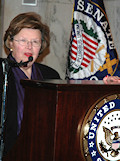 The CEEC invited a number of distinguished guests to address the gathering. They thanked the CEEC for its ongoing efforts, expressed their support for NATO and the The CEEC invited a number of distinguished guests to address the gathering. They thanked the CEEC for its ongoing efforts, expressed their support for NATO and the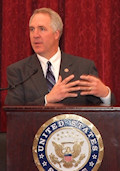 open door policy, reviewed U.S. Russian relations and urged the inclusion of Georgia and Ukraine in the MembershipAction Program. open door policy, reviewed U.S. Russian relations and urged the inclusion of Georgia and Ukraine in the MembershipAction Program.
The speakers included, Senator George V. Voinovich (R-OH), Senator Barbara A. Mikulski (D-MD), Representative John M. Shimkus (R-IL), Dr. Brzezinski, U.S. Ambassador to NATO Kurt Volker, and Dr. Michael Haltzel.
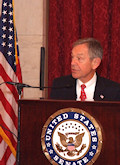 Senator Voinovich’s address was representative of the remarks made by the other speakers. He said, among other things: Senator Voinovich’s address was representative of the remarks made by the other speakers. He said, among other things:
"I felt all throughout the Cold War that as long as our brothers and sisters did not enjoy freedom, our freedoms were in jeopardy. Frankly I never thought I’d ever see the Wall torn down and the curtain torn…When it did my main goal was to do everything in my power to get countries from the former Soviet Union, Warsaw Pact, and Tito’s Yugoslavia into NATO. 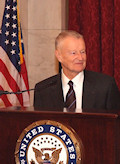 I understood that getting these countries into NATO would help the Alliance and also guarantee that if history repeated itself and Russia slipped back into its habit of expanding its influence in the region, countries would be safe from the growing claws of expansionism... I understood that getting these countries into NATO would help the Alliance and also guarantee that if history repeated itself and Russia slipped back into its habit of expanding its influence in the region, countries would be safe from the growing claws of expansionism...
But while I am pleased with the progress made by NATO, our work is not yet done. We must continue to fight for a NATO that includes a unified and democratic Europe."
![Dr. Michael Haltzel astutely observed that “[i]t is not often that foreign policy actions by the United States prove to be completely successful. The NATO enlargement rounds of 1999 and 2004 fall into that category, and I am proud to have been able to play a small part in their realization.” Dr. Haltzel served as the senior foreign policy advisor to then Senator Joseph R. Biden, Jr., (D-DE). He was the lead Democratic Senate staffer on NATO and Balkan policy and, as such, was deeply involved in two rounds of NATO enlargement (1998; 2004) and in the Bosnia and Kosovo campaigns. The Senate NATO Observer Group was established in April 1997 and chaired by Sen. William V. Roth, Jr. (R-DE) and co-chaired by Sen. Biden.](images/NATO_Congress_2009/NATO_Congress_2009_Haltzel_sm.JPG) Dr. Michael Haltzel** astutely observed that “[i]t is not often that foreign policy actions by the United States prove to be completely successful. The NATO enlargement rounds of 1999 and 2004 fall into that category, and I am proud to have been able to play a small part in their realization.” Dr. Michael Haltzel** astutely observed that “[i]t is not often that foreign policy actions by the United States prove to be completely successful. The NATO enlargement rounds of 1999 and 2004 fall into that category, and I am proud to have been able to play a small part in their realization.”
![Marju Rink-Abel, President of the Estonian National Council, gave the closing comments on behalf of the CEEC, noting that a strong NATO should help ensure that those who are its members will not experience such atrocities and loss of freedom [as under the Soviet Union].](images/NATO_Congress_2009/NATO_Congress_2009_Marju_Rink-Abel_sm.JPG) Marju Rink-Abel, President of the Estonian National Council, gave the closing comments on behalf of the CEEC, noting that a strong NATO should help ensure that those who are its members will not experience such atrocities and loss of freedom [as under the Soviet Union]. As John Beyrle, United States Ambassador to the Russian Federation, stated in his greetings to the CEEC on the occasion of today’s reception, “Our common goal must be to demonstrate, through the strength and solidarity of a transformed alliance that effectively responds to the challenges of the 21st century, that the continued enlargement of NATO over time is a net contribution to global peace and security. With the support and commitment on the part of CEEC, I know we will succeed in this.” Marju Rink-Abel, President of the Estonian National Council, gave the closing comments on behalf of the CEEC, noting that a strong NATO should help ensure that those who are its members will not experience such atrocities and loss of freedom [as under the Soviet Union]. As John Beyrle, United States Ambassador to the Russian Federation, stated in his greetings to the CEEC on the occasion of today’s reception, “Our common goal must be to demonstrate, through the strength and solidarity of a transformed alliance that effectively responds to the challenges of the 21st century, that the continued enlargement of NATO over time is a net contribution to global peace and security. With the support and commitment on the part of CEEC, I know we will succeed in this.”
In addition to the two hundred invited guests, also present at the reception were several ambassadors, representatives from various embassies, staff from a number of congressional offices, Zoltan Bagdy, Co-President of the Federation, and Thomas H. Teglassy, Chairman of the Federation’s Membership Committee.
Following the reception, the CEEC issued its April 2009 Statement on NATO Enlargement and Supporting the Open Door Policy.
____________________________________________
*The Caucus Room is not only grand, it has a rich history, serving as a stage for several well-known investigations, such as the sinking of the Titanic, the Teapot Dome scandal, Pearl Harbor, the Kefauver Crime Committee, the Army vs. McCarthy, the Viet Nam War and Watergate.
**Dr. Haltzel served as the senior foreign policy advisor to then Senator Joseph R. Biden, Jr., (D-DE). He was the lead Democratic Senate staffer on NATO and Balkan policy and, as such, was deeply involved in two rounds of NATO enlargement (1998; 2004) and in the Bosnia and Kosovo campaigns. The Senate NATO Observer Group was established in April 1997 and chaired by Sen. William V. Roth, Jr. (R-DE) and co-chaired by Sen. Biden.
- Photos courtesy of Inga Lukaviciute, Embassy of Lithuania and Peter Alunans
< Back to AHF and NATO
[<< Back to All AHF News]
| Related Links
- April 29, 2003 - US Senate Testimony: "NATO Enlargement: Promoting Western Values, Strengthening the Alliance." Calling attention to minority protections. before the United States Senate Committee on Foreign Relations.
- March 25, 2009 - US Senate Reception on the Occasion of the Policy Reception in Honor of NATO and Its Enlargement - : Remarks of Frank Koszorus, Jr.
- April 2009 - CEEC statement on NATO Enlargement and Supporting the Open Door Policy.
- July 2007 - Hungary's Accession to NATO: An expanded report by Frank Koszorus, Jr.
- October - November 1997: The Debate on NATO Enlargement:
Hearings Before the U.S. Senate Committee on Foreign Relations. Testimony of Frank Koszorus, Jr., President, AHFDC. An interesting exchange with Sen. John Kerry.
- June 20, 1996 - U.S. Policy Toward NATO Enlargement: Hearing before the Committee on International Relations,
United States House of Representatives 104th Congress, Second Session: Testimony of Frank Koszorus, Jr., President, AHFDC.
- June 2007 - Hudson Institute Panel: Enduring Strains of Communism
in Central and Eastern Europe
- March 29, 2004 - On the Occasion of NATO Expansion, Corcoran Gallery of Art. AHF Remarks by Frank Koszorus, Jr.: NATO
Enlargement and Minority Rights
- October 24, 2003 - AHF Memorandum on Romanian President Iliescu Visit
Join online!

|



